The real estate transaction that enabled White settlers to colonize Manhattan was in reality an ethnic cleansing operation. Trump, whose first real estate grifts were perpetrated in Manhattan, knows deep in his High Dollar criminal class DNA that ethnic cleansing is part and parcel of doing the business of the ruling elite.
Hence real estate inhabited by the Palestinian people, to appropriate the ugly, soul-defying lexicon of business insiders, is transactional. Genocide and ethnic cleansing are just business as usual under capitalist despotism. Nothing new under the sun here, including The US military acting as a mafia-grade enforcer arm of the criminal enterprise.
Once again, Trump, by his inherent criminal character, exposes the death-rancid essence of empire. The US/Zionist land-grab amounts to gentrification by militarist imperium.
Stateside, the criminal enterprise operates by means of life-defying rent increases and court ordered evictions of longtime residents of “transitional neighborhoods.”
In a just universe: “We are only conducting business,” the damned, condemned to Business Class Pit Of The Inferno, would snarl in protest.

Yet despite odious act upon odious act, pushback against Trump’s agendas, as waged by so-called resistance liberals, has been crushed to shit-dust. Elon Musk, resembling a dancing bear in a meth house, has had his victory dance. Trump swagger/waddles in front of presscore cameras on a daily basis and issues more crackbrained mandates as he continues his dance of domination with the corpse of human decency. As, per always, Democrats retreat to the shadows, even as Trump promises he intends to inflict ethnic cleansing and unprovoked military adventurism. Forcing the perennial question, if the Democrats, as they have proven dismal time and miserable time again, are incapable of acting as an viable opposition party — why does the party even exist?
All transpiring as the peace candidate (guffaw) Trump continues banging his little, tin wardrum. He demands the polar ice surrender and melt away in retreat. He gropes and grabs southwest ward, as if the nation of Panama is a Miss America contestant, believing all he surveys is his birthright. Trump will pussy-grab the canal until it submits.
The Terror of Tiny Town on the Potomac is having his moment.
“Thy soul is by vile fear assailed, which oft so overcasts a man, that he recoils from noblest resolution, like a beast at some false semblance in the twilight gloom.” ― Dante Alighieri, Inferno, The Divine Comedy
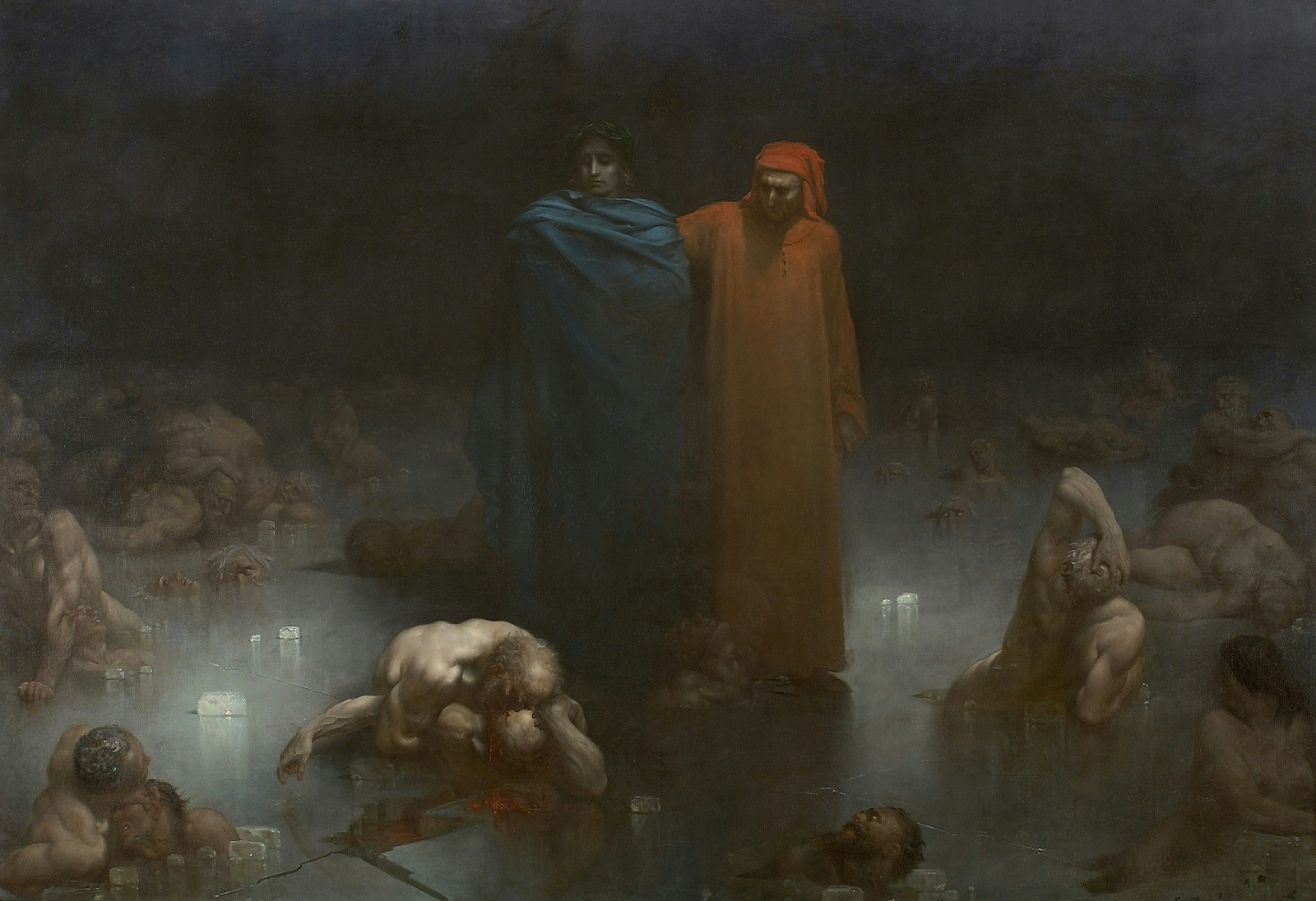
The proto-fascistic transgressions of duopoly-based High Dollar rule has made MAGA authoritarianism all but inevitable. Why? Because, in regard to the citizenry of the US, the conception of what it means to be a human being, while enclosed in cultrual atomization thus not possessing the capability of meaningful engagement within the polis, has been incrementally defined downward. The platitudes of the republic remain…as muttering ghosts as the billionaire class yawp in unimpeded ascendancy, “If we weren’t brilliant how then did we become billionaires? Just let go and let the tech-gods guide the course of your little lives.”
“These dwell among the blackest souls, loaded down deep by sins of differing types. If you sink far enough, you’ll see them all.” ― Dante Alighieri, Inferno, The Divine Comedy
Even before the rise of tech-authoritarianism there had been a significant measure of discourse regarding what was termed the “dumbing down of American life.” But little examination has been directed at the pervasive corporate blandification (with its underpinning of building angst) of daily life in the nation e.g., the manner by which the tones and textures of every day existence within the declining nation both attenuates the personality of an individual and renders the nation’s landscape (and mindscape) monotonous, stressful, and ugly.
Even within the perpetual thrall of the present hyper-commercialized, pixel-generated, collective mindscape, earthbound libido is crucial to survival. Envelopment within a tech-generated simulacrum causes the thoughts of the heart to wither. The human psyche, deracinated, loses crucial aspects of its humanity. A vital agora is not a luxury; the eros evinced therein makes humans human beings – as opposed to merely, tragically, a series of limbic system reactions beholden to electronically generated stimuli.
“My thoughts were full of other things When I wandered off the path.” ― Dante Alighieri, Inferno, The Divine Comedy
…Wandered, fuckwitted, to invidious places to which the mind is prone to go. Given the prevailing mindset of the present, there is no need for fascist-minded leaders to stage mass rallies replete with bonfires and torches blazing against the totalitarian darkness: The techno-corporate junta (waged by the power inherent to vast wealth inequality) has established and retrenched its reign by colonization of the psyche. Dopamine enhancement as bribe; in extremus, homelessness as punishment.
Corporate oligarchs, and their political bagmen, perched atop the present order do have a need for reeducation camps or the ever-vigilant gaze of neighborhood block captains. The citizenry have become our own, ever-vigilant minders; within us, we have in place vast networks of secret police informers — our own personal bully boy enforcers of corporate blandness and internal propagandist promulgating misdirected rage — whose predatory presence within renders the citizenry as empty as the blandifying architecture of the corporate nothingscape.
All as the political class grows bloated with the defacto bribes proffered by the moneyed class. The Democrats, displaying their cringe-inducing combination of fecklessness and smugness, continue to retail their grift of “sensible centrism” yet, concurrently, displaying extremism in their cupidity. In short, playing their part in the perpetuation of one party rule i.e., Money Party domination of every aspect of existence within the empire.
There is not a leftist voice in play in any manner in present day discourse, either cultural or political basis. Leftward perspectives (e.g., anti-genocidal) are not allowed entrance into the closed club of mainstream (now christened, legacy) punditry. The alleged center has moved further and further rightward as the right has marched into the territory of discernible fascism and theocracy.
Mainstream Democrats and centrist pundits have adapted to the despair-inducing criteria of the era by appropriating the mandatory mode of mind when dominated by authoritarianism — self-annihilation by fecklessness.
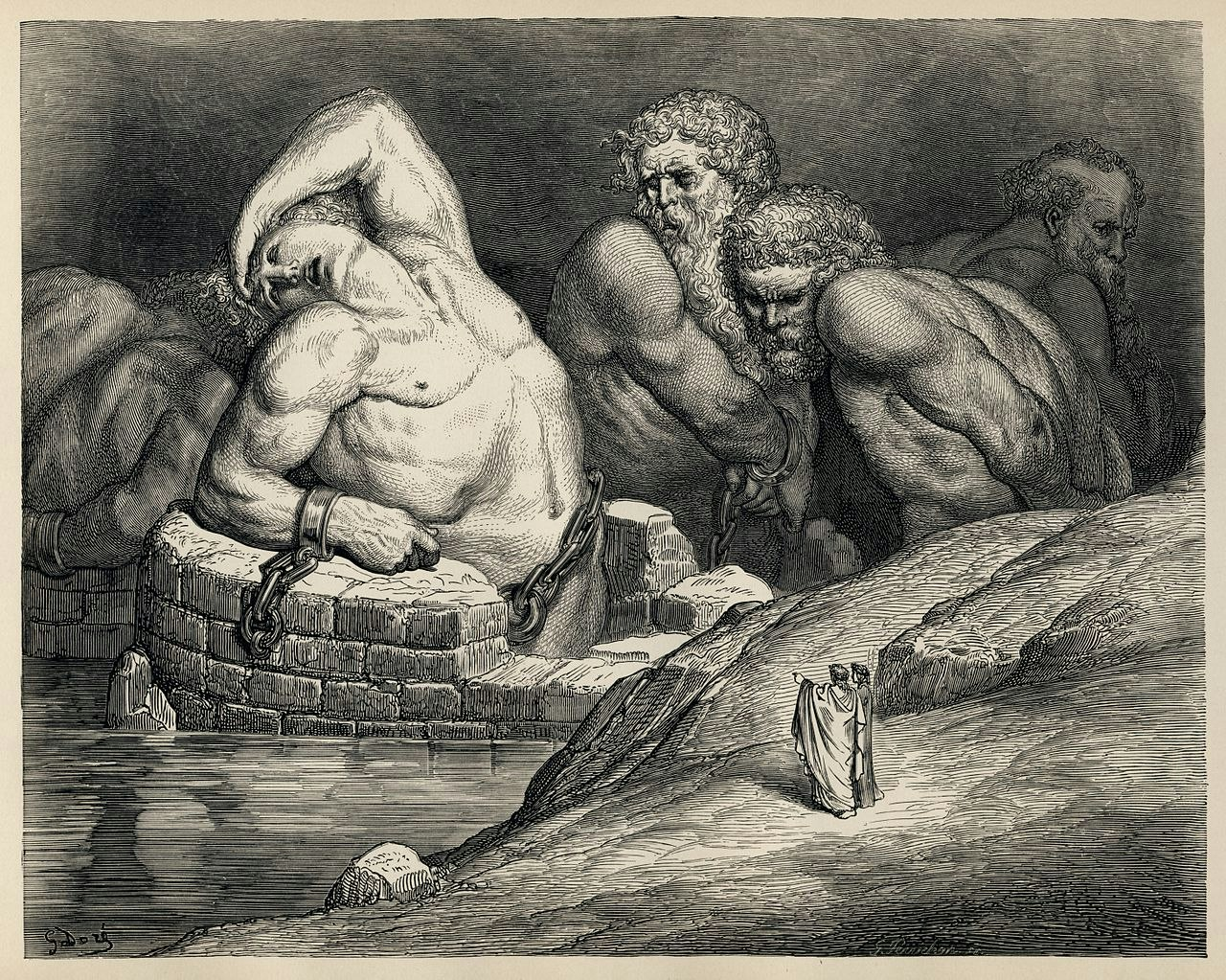
“So many times a man’s thoughts will waver, That it turns him back from honored paths, As false sight turns a beast, when he is afraid.” ― Dante Alighieri, Inferno, The Divine Comedy
How then is it possible to maintain the fantasy that voting every two to four years can alter the course of the ship of state, even when treacherous shoals are sighted on the horizon line?
And this arrives at the (heartless) center of the tragedy of corporate hegemony: The manner in which the system’s monomaniacal drive for excessive profits and the habitual consumerism mandatory to sustain the system serves to usurp our essential longings and passions. The absence, in contemporary life, of (non virtual) public space, wherein human to human discourse can flourish has created the social conditions inherent to the rise and pernicious influence of anti-democratic institutions such as the seething totalitarianism on display within the nation’s archipelago of megachurches.
The loss of communal connection, in confluence with unrepentant consumerism and soul-defying materialism has wrought, within the US populace, a desperate longing for group involvement — even for those ecstatic states involving the immersion of the rational mind found within the excesses of a totalitarian mob, even though most of the activity transpires as a sofa bound, social media Nuremberg rally.
Amid the terror and grim comedy of it all I am not going to cease resisting, therefore calling out, the hideous acts of terrible people and their denial-prone enablers. But I will do so by attempting to reach the reachable. Zombie capitalism and empire-as-colossus are belligerently obtuse and outright hostile in regard to gaining a sense of self-awareness hence evincing humanity.
The empire, authoritarian by nature, is careening into runaway train mode. My advice, knowing the histories of nations gripped by hyper-authoritarian proclivities…stop, look, and listen and get the living fuck off of the tracks. This train is not bound for glory but to the junkyard of imperialist wreckage. The question is, will it even be salvageable by way of parts.
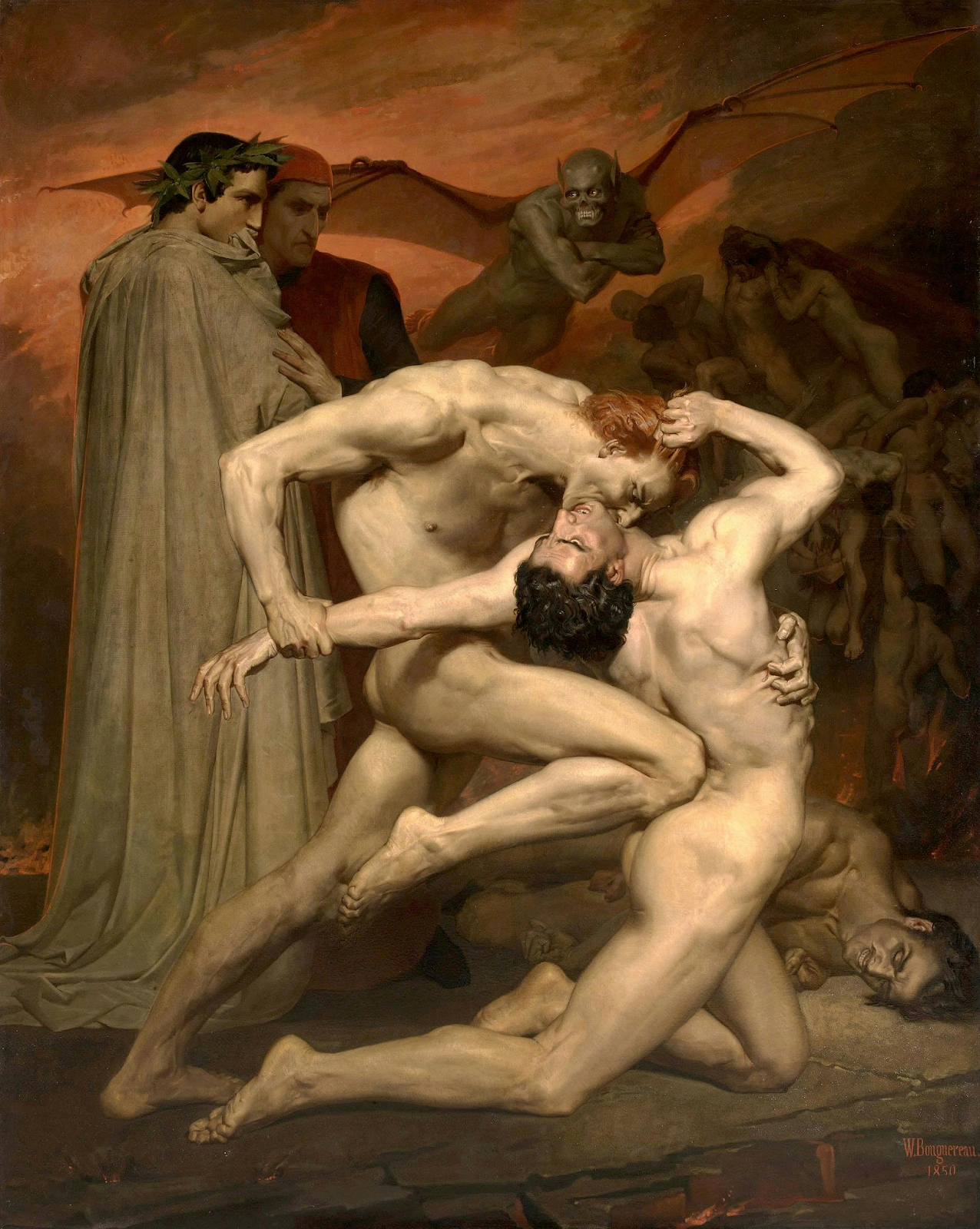
For example, the parts being, the nation’s legacy of music, a divinely mutant soundscape, its ecosystem engendered by a polyglot culture resistant to the hysterical dictates of tone-deaf nativist shitheels.
These are the regions of the national soul we on the left must reclaim. Traditionally, music has aided progressives in the struggle. Woody Guthrie posited, all songs are political. Songs take up residence in our hearts and in the non-verbal areas of our minds where we harbor our deepest longings. There, they inform our perceptions of the world. It is this sublime terrain, existing beyond the material, that progressives have abandoned to frauds and flimflammers.
Lost, in our retreat from cultural resonance, has been our affinity with the spirit of defiance as evinced by Jim Crow era African Americans’ deep and penetrating longing for release from hard labor beneath an unforgiving Mississippi sun that found voice during late night, crossroads barroom freedom freighted in the Delta Blues and northeastward, urban dwellers found refuge from the dehumanizing, daylight demands of mid-twentieth century, Industrial Age existence by getting lost in the sublime of midnight transcendence delivered by Bebop and Free Jazz.
Also missing in (ecstatic) action has been an atmosphere (cultural and personal) of creative risk and abandon, whereby Jimi Hendrix would conjure and fuse the urban and rural spirits of Robert Johnson and John Coltrane, plus toss some Malcolm X into the mix then, a short time later, and further down a southbound road, Duane Allman would resurrect a redneck hippie, guitar Jesus who fed the post-honky tonk multitudes Orange Sunshine as he delivered an electric guitar Sermon On The Georgia Red Dirt Mount by fusing the spirits of Tim Leary, Martin Luther King, and the Carter Family. A few years later, across the Atlantic, the Sex Pistols would howl like Post-Industrial Age demons, trapped within the detritus of the crumbling British Empire . . . much like, nearly a decade and a half later, Kurt Cobain would have his short, Icarian flight across the flaming-out sun of the American Empire.
In order to restore humanity and its concomitant full-spectrum of numinous experiences to American life, we must wrest back the embrace of ecstatic states from brown shirt-prone, bible-caressers, and humor back from retrograde, rightist punch-down artists whose soul joke goes, my pronouns are…asshole.
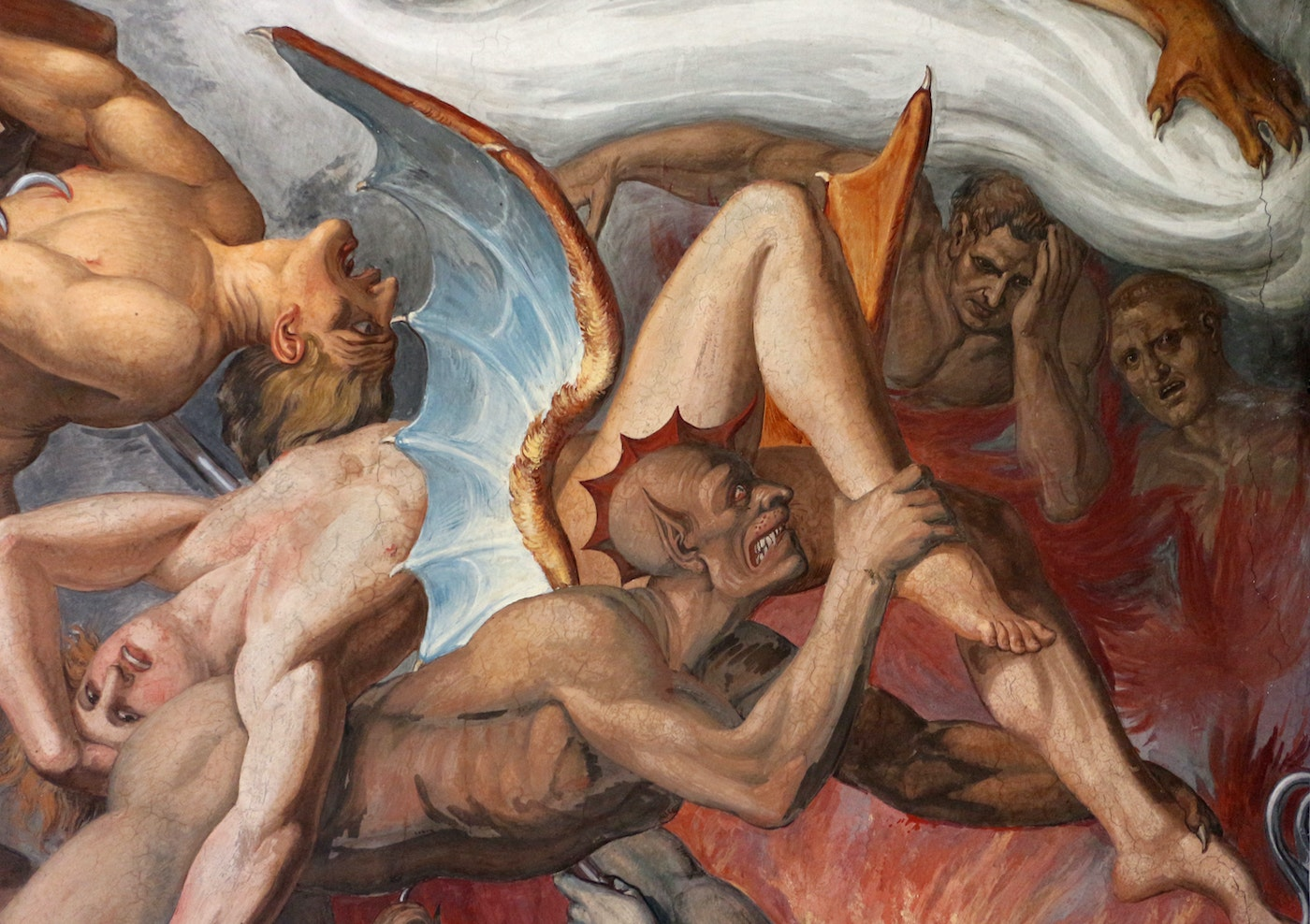
For pride and avarice and envy are the three fierce sparks that set all hearts ablaze.” ― Dante Alighieri, Inferno, The Divine Comedy
In conclusion, we are advised to live with the same degree of passion and fervor as fundamentalist Christian preachers … when they’re seeking out converts and, covertly, navigating grinder for apostles of the flesh and Trump on a late night X-binge. Or Musk’s ardor to be the sperminator of Mars.
“Soon you will be where your own eyes will see the source and cause and give you their own answer to the mystery.” ― Dante Alighieri, Inferno
 FacebookReddit
FacebookReddit
Phil Rockstroh is a poet, lyricist, and essayist. His poems, short fiction, poetry and essays have been published in numerous print publications and anthologies; his political essays have been widely posted on the progressive/left side of the internet. Visit and subscribe to Phil’s Substack newsletter at https://substack.com/@philrockstroh. Read other articles by Phil. Are the Dead Nostalgic?
by Edward Curtin / February 19th, 2025
I was asking this question recently when the nightmare of the Israeli genocide of Palestinians greatly disturbed my reflections and took me in another writerly direction. Now I wish to return to this matter that seems perpetually pertinent, a pertinence, of course, not unconnected to the dead in Gaza, Ukraine, and everywhere else. There are so many ways of getting dead – and living – that complicate my question.
I am certain of this, however, that there is much to be said for talking to the dead, even asking them if they are nostalgic.
I have just awakened from a night of dreams in which I was cavorting with a bunch of the dead and they told me many things, one of which was to pursue my question into my daydreams, which this essay may be called, in the etymological sense of that word – to essay, that is, to try, to experiment without knowing where one is going. Surely one does not want to forget that life is an experiment into the unknown, as is its companion – death. And that all travel ends in the enigma of “arrival.”
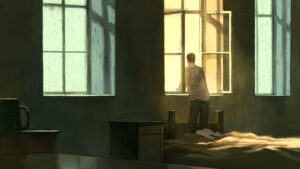
Hokyoung Kim
I got a hint of it once, when after a game in which we won against our arch-rival and I played very well, a visitor to the locker room congratulated me by saying, “Great game,” and I responded with false modesty, saying “It was okay,” knowing that I did play very well but was unable to accept the compliment. I have never forgotten that incident that suggests to me that there was something deeper than playing well and just winning a game that I was after, and that my stupid response to the compliment revealed – or did it conceal? – this from me.
So I wonder: Why am I writing this essay? To win your applause? Something more? I know I am writing it for myself, but I could keep it private.
Perhaps you will agree that the question about the dead’s nostalgia is a touchy philosophical question that might have no definitive answer. Even if we could, in modern data-driven fashion, construct a sociological survey, how would we choose a “representative” sample of the dead? Where would we find them – up, down, way out there, next to us? The thought of it seems flippant in an impossible way, which it is, but its flippancy holds a secret message.
So I asked the dead who would speak to me and got a few mixed, muffled replies. You can understand their reluctance to say anything.
If I heard correctly, one of them said, “You should ask the living.” Another, who seemed offended that I considered him dead, said, “Why are you asking me?” Most didn’t answer, which had me wondering why. Were they disgusted with us?
But then I wondered: Who are the dead? That too is a touchy question.
I have always heard that nostalgia was not good for you since it kept you rooted in the past; that this ache for home (Greek, algos, pain + nostos, homecoming) – the good old days that may or may not have existed but you miss them nevertheless – prevented you from living Zen-like in the present or looking forward to the future.
Yet the English writer and art-critic John Berger suggested otherwise when he wrote that, paradoxical as it seems, there is also a nostalgia for the future that is hopelessly desired, not hopelessly lost. A journey, propelled by an “indefinable ache,” to an imagined future created out of recollected moments of love and beauty. While often found in the work of artists of all types, it is available to everyone open to revelations from out of the blue. But one must imagine, as John Lennon sang.
So I wondered if nostalgia could be a form of utopian hope at a time when humanistic utopian thinking is at a nadir, overwhelmed by constant bad news, subtle propaganda wherein contradictions and truths coexist in chaotic indifference, and the machine dreams of people like Elon Musk and the digital devils like those at the World Economic Forum and in Silicon Valley.
The denigration of nostalgia assumed you were alive. I was wondering about the dead. What did they think? Did they wish they were alive? Was being alive the good old days for them, or did they feel they were finally home and that life had been a dream?
Or did the dead have no future, no nothing, or perhaps some afterglow of sorts, an everlasting rest in peace, whatever that may mean, a phrase that always seemed to me a bad knock on life. Who wants to sleep forever as cemeteries (Greek koimeterion, sleeping place, dormitory) remind us by their eerie silence?
If sleep is peace, why bother to wake up in the morning?
But what about the other dead, the living-dead? Had they killed all livingness in themselves in order to avoid another death? To paraphrase T.S. Eliot – Were we led all this way for death or birth? Yes, the enigma of arrival.
I guess I was thinking that if I could get in touch with the dead and get them talking, they might also tell me what it was like to be dead. Although I am no statistical whiz, I figured there were a lot more of them than the living, and the odds were pretty good that someone there would spill the beans.
I thought of this recently when watching the new film about Bob Dylan’s early years, A Complete Unknown, when his film girlfriend, Sylvie Russo, based on the real Suze Rotolo, gets angry at him for concealing his true past and identity, and he replies, “People make up their past, Silly, they make up what they want; [they] forget the rest.”
This has a ring of truth to it, whether it’s from memory lapses or some sense of wanting to fictionalize their pasts for reasons known only to them. Our memories and forgetteries are interesting creative faculties.
But as I said, I was interested in the dead. Did they also do that? Were they nostalgic in the looking-back sense?
Yet their silence was deafening. I grew very frustrated. I felt my proclivity for abstruse questions might be leading me astray, away from my own nostalgia, an easier question to answer.
This thought came to me when I just heard the bell ring on my Hermes manual typewriter, and I returned the carriage to type these words.
Ah, the bells, the calling of the bells, their tinkling and tolling, the bells for meals at the Edgewater Farm of my youth, the bells of St. Brendan’s grammar school calling us to freeze our positions as we played in the street during lunch break, my tinkling of the bells in the sacred hush as an altar boy, the church bells still ringing at St. Peter’s church in town, Bob Dylan’s song Ring Them Bells, Edgar Allen Poe’s The Bells and Phil Ochs’ version in song, Leonard Cohen’s vesper bells in When Night Comes On, ringing for me, calling me somewhere, resonating “to the tintinnabulation that so musically wells” up thoughts that do often lie too deep for tears or laughter.
I hear the bells, but I still do not know if the dead are nostalgic. It seems like the wrong question. For this daydream in words has brought me to that enigmatic place of arrival where I am nostalgic for my dear departed dead loved ones. They still talk to me, but don’t answer obnoxious questions.
As for the past, I can echo the concluding words of Don DeLillo’s alter-ego, Nick Shay, in his great novel Underworld:
I long for the days of disorder. I want them back, the days when I was alive on the earth, rippling in the quick of my skin, heedless and real. I was dumb-muscled and angry and real. This is what I long for, the breach of peace, the days of disarray when I walked real streets and did things slap-bang and felt angry and ready all the time, a danger to others and a distant mystery to myself.
As for the living, John Donne summoned it up:
Therefore, send not to know
For whom the bell tolls,
It tolls for thee.

No comments:
Post a Comment